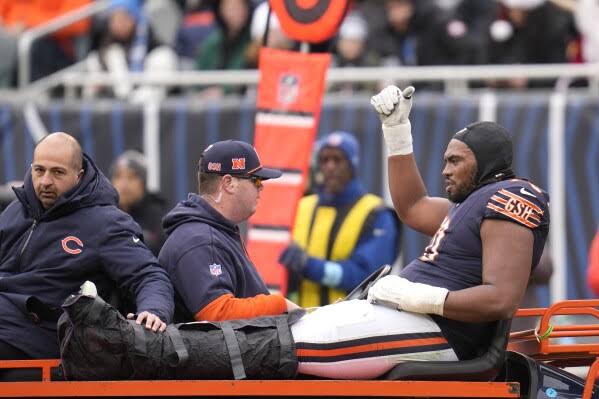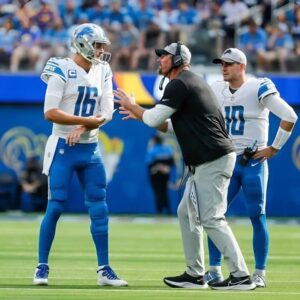
The Chicago Bears’ 34-17 loss to the Detroit Lions on Sunday not only handed the team a tough defeat, but also compounded their season-long struggles with injuries—particularly along the offensive line. With two more key linemen going down during the game, the Bears are facing an increasingly difficult path to staying competitive in the NFC North. The loss has many wondering whether the Bears can overcome this mounting crisis, or if their playoff hopes are already dashed.
A Season of Injuries
For much of the 2024 season, the Bears have battled a string of injuries that have plagued their offense. Yet, none may be as damaging as the continuous setbacks to the offensive line, which has been the foundation for protecting the quarterback and creating a balanced running game.
Prior to Sunday’s game against Detroit, the Bears had already lost several starting offensive linemen due to injury. But when the dust settled on the Week 16 matchup, it was clear that things had taken a turn for the worse. Two more key offensive linemen—right tackle Teven Jenkins and left guard Cody Whitehair—were both forced to leave the game due to injuries, leaving the Bears with even less depth and experience up front.
Jenkins, a former second-round pick who had been playing at a high level this season, went down with an apparent ankle injury, while Whitehair, a veteran leader on the line, suffered a knee injury that left him sidelined for the remainder of the game. Both injuries are expected to be evaluated further in the coming days, but early reports suggest that Jenkins’ injury could sideline him for multiple weeks, while Whitehair’s status is more uncertain.
Offensive Struggles: More Than Just the Injuries
While the loss of key players on the offensive line is certainly a significant blow, the Bears’ offensive struggles go beyond just the injuries. Quarterback Justin Fields, who had shown flashes of brilliance earlier in the season, has struggled to find consistency in recent weeks. The lack of protection from the offensive line, compounded by pressure from opposing defenses, has made it difficult for Fields to establish any rhythm in the passing game.
Against the Lions, Fields was sacked three times and faced constant pressure throughout the game. The lack of a stable pocket not only hampered Fields’ ability to make plays but also disrupted the Bears’ ground attack. With starting running back Khalil Herbert still recovering from injury and Rashaad Penny being limited in his role, the Bears’ run game was virtually non-existent, putting even more pressure on the passing game.
The Lions, led by a high-powered offense, capitalized on the Bears’ vulnerabilities. Quarterback **Jared Goff** threw for 280 yards and three touchdowns, while the Lions’ defense smothered Chicago’s offense with relentless pass rush and tight coverage. It was a team effort from Detroit, but the lack of offensive line cohesion on Chicago’s part was undeniably a key factor in the Bears’ defeat.
The Depth Problem
One of the biggest challenges facing the Bears now is the lack of depth on the offensive line. Even before the injuries to Jenkins and Whitehair, Chicago had been relying heavily on unproven players and backups. As the team continues to shuffle players in and out of the lineup, the question arises: Can the Bears afford to keep experimenting with an undermanned line, or will they need to make major adjustments to keep their offense functional?
Braxton Jones, the Bears’ starting left tackle, has also faced his share of struggles this season. While his athleticism is evident, his inconsistency in protecting Fields has led to numerous pressures and sacks. With Jenkins and Whitehair now unavailable, Jones will likely have to play an even more significant role in holding down the fort on the left side of the line.
Meanwhile, the Bears’ depth pieces—such as Darnell Wright (right guard) and Lucas Patrick (center)—will need to step up to fill in for the injured starters. Both players have seen starting time this season, but neither has demonstrated the level of performance needed to keep this unit from crumbling.
Playoff Hopes Fading
The Bears entered the 2024 season with high hopes, especially after making several offseason moves to improve their roster. However, injuries and inconsistent play have put a serious dent in those aspirations. With a 5-9 record entering Week 16, Chicago’s playoff chances were already slim, but the loss to Detroit—with the additional blow of key injuries to the offensive line—could be the final nail in the coffin.
Head coach Matt Eberflus will now have to rally his team in the face of adversity. “It’s been a tough year, but we have to keep fighting,” Eberflus said after the game. “We’re a next-man-up team, and that mentality will need to carry us through these last few weeks. We’ve got to dig deep.”
For Fields, the stakes are high. The third-year quarterback is still looking to prove himself as a long-term solution for the Bears. While he has shown flashes of the playmaking ability that made him a first-round pick, the inconsistency of the offensive line and the lack of talent around him has made it difficult to judge his true potential. With a roster that’s continuing to develop, Fields will need to continue to mature and show leadership despite the obstacles in his way
What’s Next for the Bears?
Looking ahead, the Bears will need to explore every avenue to patch together their offensive line for the final games of the season. There is little time left for experimentation, and they may need to sign free agents or promote practice squad players to bolster the line. Chicago also faces a difficult road stretch to close out the season, with matchups against playoff-contending teams like the Minnesota Vikings and the Green Bay Packers.
Beyond this season, the Bears’ front office may need to re-evaluate their approach to building a championship-caliber offensive line. The current issues point to a larger problem: inconsistent play from the starters, a lack of depth, and insufficient protection for their young quarterback.
As the 2024 season winds down, the focus will shift to how the Bears respond to adversity. Can they find a way to stay competitive despite their offensive line woes? Or will the growing injury list and lack of production up front signal the end of their playoff dreams for this year? Only time will tell—but one thing is certain: the Bears’ ability to rebuild their offensive line will be critical to their success in the years ahead.





